- Home
- Victor Pelevin
Empire V Page 4
Empire V Read online
Page 4
‘A-M-A-T,’ I began spelling out the letters backwards. ‘No, A-M-A-R …’
‘Rama,’ Mithra corrected me. ‘According to ancient custom, vampires take the names of gods. But all gods are different. You will have to think deeply about the meaning of your name. It is a lamp which will illuminate your path.’
He fell silent, evidently anticipating another question. But I had no more to ask.
‘That is the way we speak of it – the lamp, I mean,’ explained Mithra. ‘It’s another of our traditions. But to be honest, you won’t get lost even without the lamp, because for a vampire there is only the one path. And with or without a lamp there is only one direction for you to travel.’
He broke into laughter.
‘Now it is time for me to go,’ he said. ‘We shall meet again at the time of the Great Fall.’
Must be some kind of a joke, I decided.
‘What on earth is that?’
‘It’s a sort of examination to become a vampire.’
‘I’m not much good at exams,’ I said. ‘I usually fail them.’
‘You must never blame yourself when the blame should be put on the system. That essay you wrote was very good, full of freshness and candour. It also testified to your literary gifts. Your only problem was that there were already too many snails on the summit of Fuji.’
‘You got that from biting me, I suppose?’
He nodded, thrust his hand into his pocket and withdrew a narrow glass tube, about the dimensions of a cigarette, with a plastic stopper at either end. The phial contained several drops of blood.
‘This is your personal material. Others will acquaint themselves with it – our superiors.’
He raised his eyes upwards in an expressive gesture.
‘Now let’s deal with a few practical problems. You will find money in the escritoire. I expect you will need some. Your meals will be brought up from the restaurant downstairs. A cleaning lady will come in twice a week to tidy up. If there is anything you need, just go out and buy it.’
‘Where could I possibly go, looking like this?’ I asked, nodding towards the reflection of my ravaged face in the mirror.
‘That will soon clear up. I’ll arrange for you to be brought everything you need, in the way of clothes and shoes.’
‘Shall I tell you my size?’
‘No need,’ he answered and clicked his tongue. ‘I already know it.’
ENLIL MARATOVICH
As a child I was always hungry for miracles. I would have unhesitatingly jumped at the chance to become a flying Tibetan yogi like Milarepa or to study with a famous magician, as Carlos Castaneda and Harry Potter did. Even a less illustrious destiny would have done for me: to become a hero of the cosmos, to discover a new planet, or to write one of those great novels that shake the hearts of men, forcing critics to grind their teeth and fire their turd projectiles from the depths of their stinking pits.
But to become a bloodsucking vampire …
At night I was plagued by bad dreams. I saw my friends weeping over my misfortune, telling me how sorry they were that they could not help me. Towards morning I dreamt of my mother. She was tearful and tender in a way I could hardly ever recall her being in life. Dabbing her eyes with a handkerchief embroidered with the Von Storckwinkel crest, she whispered: ‘Romochka, my spirit watched over you as you lay asleep in your cot. But you fixed me fast to the wall with superglue and there was nothing I could do to help you!’
I did not know how to answer her, but my Tongue came to the rescue; it was viewing my dreams along with me (presumably for the Tongue there was little difference between dreams and reality).
‘Excuse me, you are not his mama,’ the Tongue announced in my voice. ‘The only thing his real mother would have said would be to accuse him of sniffing the glue.’
Then I woke up. I was lying in an enormous bed beneath a baldaquin embroidered in brown and gold. A blind of the same heavy material covered the window; all the furnishings of the room were in Gothic style. On the bedside table was a 1950s black ebony telephone.
I got up and dragged myself into the bathroom. Catching sight of myself in the mirror, I shuddered. Half of my face was covered in black and violet bruises round the eyes, which made me look as if I had been brutally concussed. They had not been visible the day before, but now they looked awful. For the rest, however, it was not too bad. I had washed the blood off the previous evening; all that could be seen on my neck was a small dried up hole just below the jawline, like the trace left by a nail that had broken the skin at that point. No blood oozed from it and it no longer hurt. It was hard to believe that such an insignificant wound could have been the cause of such excruciating pain.
My mouth had resumed its normal appearance, except for the thick orange patina that had appeared on my swollen palate. The area round it was slightly numb. The cavities from which my incisor teeth had disappeared itched horribly, and in the black orifices could already be seen the sugar-white tips of new teeth, which seemed to be growing at an implausible rate.
The kernel inside me, though ever-present, no longer troubled me. During the night I had become almost completely accustomed to it. I experienced a feeling of phlegmatic detachment, as if whatever took place concerned not me but another individual whom I was observing from a fourth dimension. The sensation induced a feeling of relaxed freedom and a pleasing absence of obligation, even though I was still in too feeble a state to attempt anything like self-analysis.
I took a shower and set about inspecting my new flat. Its size and air of gloomy luxury made a great impression on me. Besides the bedroom and the room with the filing cabinet there was a home cinema room with a collection of masks on the wall: Venetian, African, Chinese and some others that I could not identify. There was also a kind of drawing room with armchairs, a fireplace and, in the place of honour, an antique radio set in a mahogany case.
Finally, there was a room whose purpose I could not divine at all. It was actually more like a large store cupboard, its floor covered with thick, soft cushions. The walls were draped in black velvet decorated with stars, planets and the sun. All the heavenly bodies bore human faces, sombre and impenetrable. In the middle of the room there was an object resembling a huge silver stirrup: a horizontal bar attached to a curved metal rod hanging by a chain from the ceiling. From the wall protruded a metal valve wheel, which raised or lowered the rod above the cushions. What the purpose of this apparatus was I could not imagine, unless it were to accommodate a giant parrot with a taste for solitude … Also on the walls of the storeroom were some small white boxes resembling alarm sensors.
The room with the filing cabinet, where Brahma had shot himself, was at least more familiar to me as I had spent some considerable time in it. I therefore felt entitled to inspect it in greater detail.
It had clearly served its former owner as a study, even though it was hard to determine what sort of work he had done there. Opening at random some of the drawers in the cabinet I found plastic racks supporting clips of test tubes, sealed with black rubber stoppers. Each of them contained two or three cc’s of clear liquid.
I guessed what they were. Mithra had given me my experimental ‘Windows Ex Pee’ preparation from just such a test tube. Evidently, the filing cabinet contained what was in effect a vampire’s library. The test tubes were all labelled with letters and numerals. There was also a label on each drawer front, consisting of letters and numbers. Presumably somewhere there must be a catalogue of the library’s contents.
Two pictures of nudes hung on the wall. In the first of them, a young naked girl of about twelve years of age was sitting in an armchair. The effect was rather spoilt by the fact that her head was that of a balding, no longer young Nabokov, the join in the region of the neck masked by a spotted bow tie of an overtly bourgeois design. The picture was entitled ‘Lolita’.
The other picture
showed a very similar girl, except that her skin was extra white and her breasts completely undeveloped. Nabokov’s face in this picture was distinctly old and flabby, and the bow tie masking the join disproportionately large and garish with comets, colourful cockerels and geographical symbols. This picture was entitled ‘Ada’.
There were some differences in the physical details of the two childish bodies, but it was disagreeable and even frightening to look at them too closely, because in a masterful effect the unknown artist had contrived to make the eyes of both Nabokovs stare at the viewer with a penetrating, faintly affronted intensity.
I suddenly became aware of a barely perceptible movement of air around my neck.
‘Vladimir Vladimirovich Nabokov als Wille und Vorstellung,’ said a resonant bass voice behind my back.
Startled, I turned round. A metre from me stood a short, portly man wearing a black jacket over a dark polo-neck sweater. His eyes were hidden behind black mirror glasses. In appearance he was between fifty and sixty years old, with bushy eyebrows, a hooked nose and a high, bald forehead.
‘Do you know what it was the artist intended to convey with these pictures?’ he enquired.
I shook my head.
‘Nabokov’s novels Lolita and Ada are variants of the triple bed. Vladimir Vladimirovich, like Lenin in the olden times, is always with us. That is the meaning.’
I looked from Lolita to Ada, and noticed that the latter’s milk-white skin was rather flyblown.
‘Lolita?’ I queried. ‘Does that come from LOL?’
‘I’m not with you,’ said the stranger.
‘“Laugh Out Loud”,’ I explained. ‘Internet terminology. Like “IMHO” or “ASAP”. So a “LOLita” would be a girl who laughs a lot.’
‘Ah, yes,’ sighed the stranger. ‘Autres temps, autres mœurs. Sometimes I feel that I’m a museum exhibit … Do you read Nabokov?’
‘I have done,’ I lied.
‘What do you think of him?’
‘Bullshit,’ I declared confidently. ‘Who cares what that old clown had to say?’
I had long realised this was the sort of opinion that conferred immunity from looking foolish. You could never be in error with judgments like that.
‘Old clown? Bingo, your starter for ten!’ said the stranger and smiled. ‘I see how you get there. Look at the Harlequins, right? And those lilac lozenges on Pnin’s socks … Has to be more than just a coincidence …’
I remembered that the back door was always left open. Evidently that was how this madman had got into the flat.
‘All this,’ continued the stranger, ‘can definitely be traced back to the glass pavilion in Vyra, with its coloured lozenges at which the terminally bored future writer would stare during some French or English lesson. Isn’t it incredible that such a tiny seed produced so powerful a shoot?’
He may not be mad, after all, I thought.
‘I don’t quite understand,’ I said politely. ‘What made you describe these novels of the writer Nabokov as a triple bed?’
‘Because whenever you come across lovers in his books, you always find him lying between them. Every now and again he drops in a subtle aside which draws attention to himself. This can seem rather discourteous to the reader’s sensibilities, unless, of course, he happens to be a gerontophile … Do you know what my favourite erotic book is?’
The intensity with which the stranger spoke was quite staggering.
‘No,’ I said.
‘It’s Dunno on the Moon, the third book in the trilogy about the midget people from the City of the Sun. It hasn’t a single word of erotica in it, that’s why it is the most erotic text of the twentieth century. Read it, and just think what those little guys must have got up to in their rocket during their long flight to the moon …’
No, definitely not mad. On the contrary, a very intelligent man.
‘Yes,’ I said. ‘I used to think about that too, when I was a little boy. But who are you?’
‘My name is Enlil. Enlil Maratovich if you prefer to be formal and call me by my name and patronymic.’
‘You startled me.’
He held out to me a paper napkin. ‘There is a wet patch on your neck. Wipe it with this.’
I could not feel anything, but did as I was told. Two tiny spots of blood showed up on the paper towel. I realised why he had started talking about the little people from the City of the Sun.
‘You as well … yes?’
‘Outsiders do not come in here.’
‘Who are you?’
‘In the world of people I would be regarded as top brass,’ replied Enlil Maratovich. ‘In vampire speak I am simply the co-ordinator.’
‘Ah, now I get you,’ I said, ‘although at first I thought you were just mad. Lozenges, Nabokov on the Moon … It’s your way of distracting attention, isn’t it, to keep one from noticing the bite?’
Enlil Maratovich smiled wryly. ‘How are you feeling?’
‘Not too good.’
‘I must say you don’t look very well, not to put too fine a point on it. But that is par for the course. I have brought you some cream. You must rub it into your bruises at night. By morning they will all have gone. And I’ll also get some calcium tablets for you. You should take fifteen each day, for the teeth.’
‘Thank you.’
‘I detect,’ said Enlil Maratovich, ‘a certain lack of enthusiasm for what has befallen you. Don’t pretend otherwise; there is no need. I know. It’s quite normal. Not only that, it’s admirable. It shows you are a good person.’
‘Does a vampire need to be a good person?’
Enlil Maratovich’s eyebrows shot upwards into his forehead.
‘But of course,’ he said. ‘How could it be otherwise?’
‘But surely …’ I began, but trailed off without finishing. What I had meant to say was that I saw little necessity to be a good person in order to suck the blood of another – rather the reverse, but then thought it would be impolite.
‘Rama,’ said Enlil Maratovich, ‘you have no understanding of what sort of creatures we really are. Everything you think you know about vampires is false. Now I want to show you something. Come with me.’
I followed him into the room with the fireplace and the easy chairs. Enlil Maratovich went over to the fireplace and pointed to a black and white photograph of a bat hanging above it. The photo had been taken from very close up. The bat had small, beady black eyes, erect ears like a terrier’s, and a wrinkled up pig’s snout of a nose. It looked like a cross between a piglet and a dog.
‘What is that?’ I asked.
‘Desmodus rotundus. The vampire bat. It is found in the Americas on both sides of the equator. It feeds on the red liquid in the bodies of large animals, and lives in big families in old caves.’
‘Why did you want me to see it?’
Enlil Maratovich sank into one of the chairs and motioned me to sit opposite him.
‘If you listen to the legends they tell in Central America about these tiny creatures,’ he said, ‘you would think there is no more fearful being on the planet. They will tell you that this bat is the devil incarnate, that it can assume the form of a man to entice its victims deep into the forest, that flocks of them can tear a lost wanderer to pieces. And a mass of other equally fantastic nonsense. Whenever they find a cave that is home to vampire bats, they smoke them out or destroy them by dynamiting them …’
He looked me as if inviting some kind of response. But I could not think of anything to say.
‘For some unknown reason human beings consider themselves to be the unique repositories of goodness and light,’ he continued, ‘while vampires represent the blackest progeny of hell. But if you look at the facts … Try giving me just one justification for thinking people superior to vampire bats.’
‘Perhaps,’ I hazarded, ‘because
people help one another.’
‘Only very rarely. Vampire bats, on the other hand, help one another constantly. They share any food they bring home. Something else?’
Nothing else came to mind.
‘Man,’ said Enlil Maratovich, ‘is the cruellest and most senseless killer on the planet. He has never done any good to any of the living creatures by whom he is surrounded. And as for harm … would you like me to enumerate instances?’
I shook my head.
‘And this tiny animal, chosen by man to be the emblem of his own secret terrors, never kills another creature. It does not even cause serious harm. It punctures the skin with its front incisors and then takes its two cubic centimetres, neither more nor less. What harm could that possibly do to a horse or a bull? Or a man? Medically speaking, letting a small quantity of red liquid from the veins is considered beneficial. There are documented reports, for instance, of a bite from a vampire bat saving the life of a Catholic monk who was dying of fever. But’ – and here he raised an admonitory finger – ‘you will find no documented instance of a Catholic monk saving the life of a bat dying of fever.’
It was difficult to argue with this.
‘Remember this, Rama. All the ideas human beings have about vampires are false. We are very far from being the monsters of evil that we are depicted …’
I studied the photograph of the bat. Its furry face truly did not appear threatening: rather it was intelligent, nervous and a little frightened.
‘Then what are we?’ I asked.
‘You know what a food chain is? Or, as it is sometimes called, a feeding chain?’
‘You mean, like McDonald’s?’
‘Not exactly. McDonald’s is a fast-food chain. A food chain is a sequence of plants and animals linked to one another by the relationship of food to consumer. Such as the rabbit to the boa constrictor, or the grasshopper to the frog …’ He smiled and winked at me. ‘Or the frog to the Frenchman. Or the Frenchman to the worm in the grave. Human beings believe they are at the apex of the pyramid because they can eat whomever they like, as often they like and as much as they like. This belief is the basis of human self-esteem. But in reality there is a higher stage in the food chain, a stage of which the majority of human beings have no conception. And that is us – vampires. We are the penultimate link.’

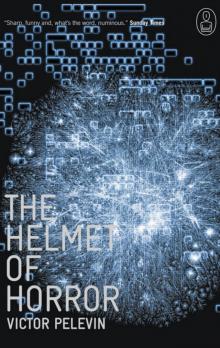 The Helmet of Horror
The Helmet of Horror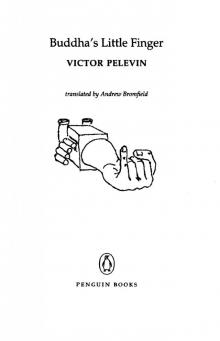 Buddha's Little Finger
Buddha's Little Finger Empire V
Empire V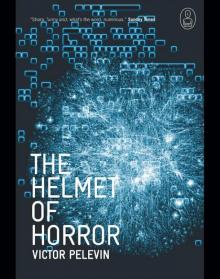 Helmet of Horror
Helmet of Horror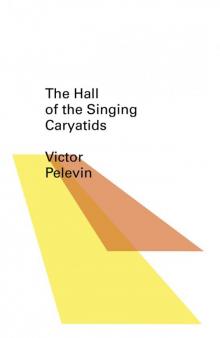 The Hall of the Singing Caryatids
The Hall of the Singing Caryatids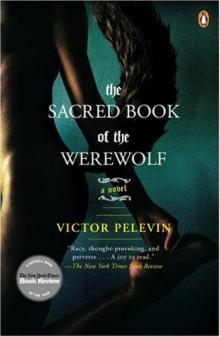 The Sacred Book of the Werewolf
The Sacred Book of the Werewolf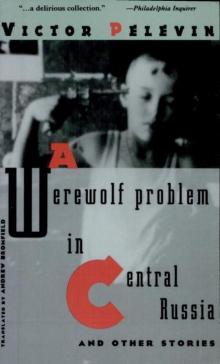 A Werewolf Problem in Central Russia and Other Stories
A Werewolf Problem in Central Russia and Other Stories